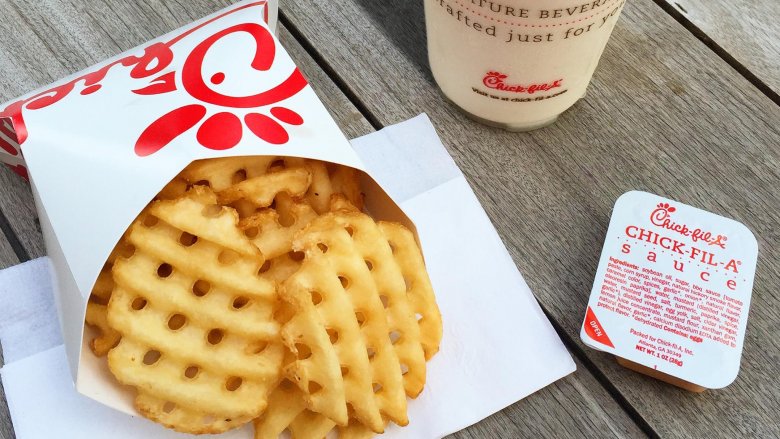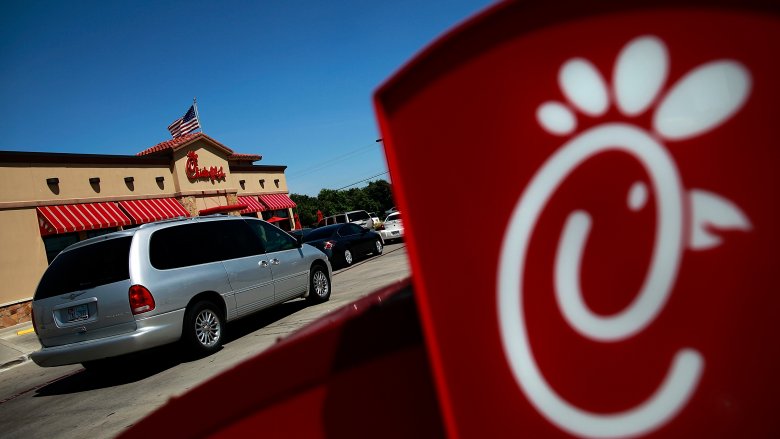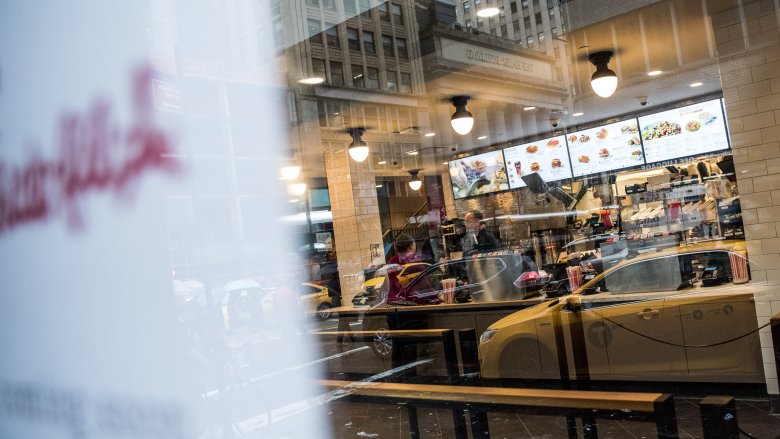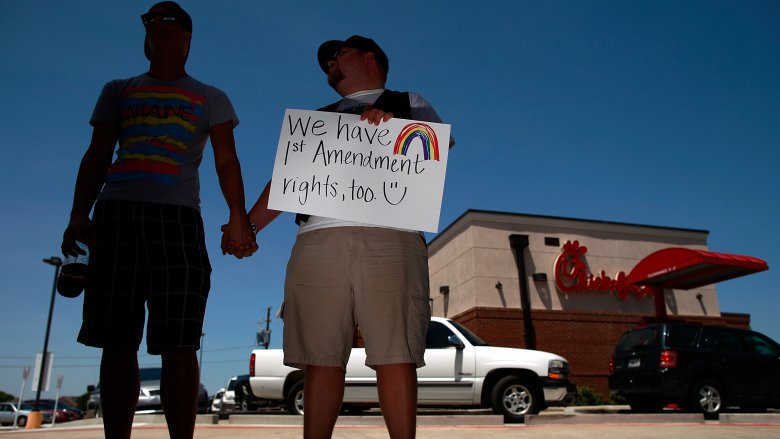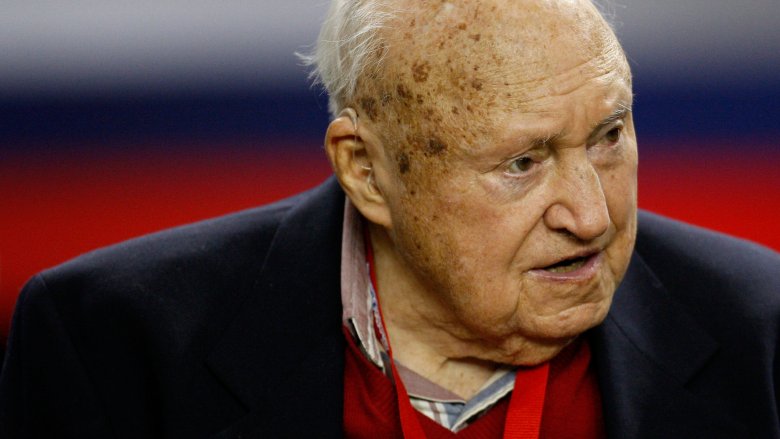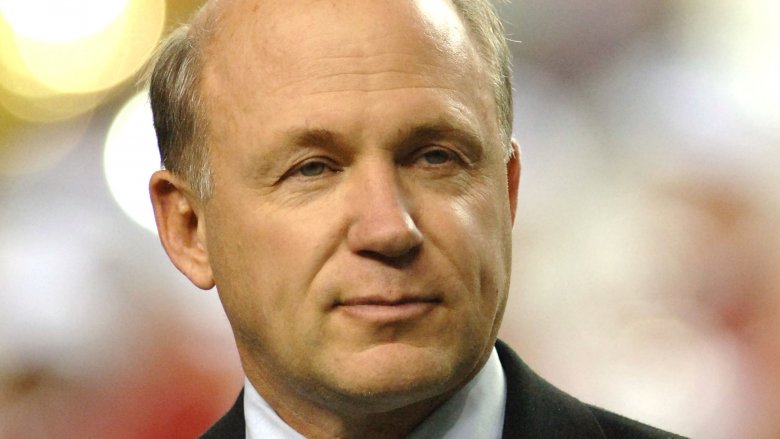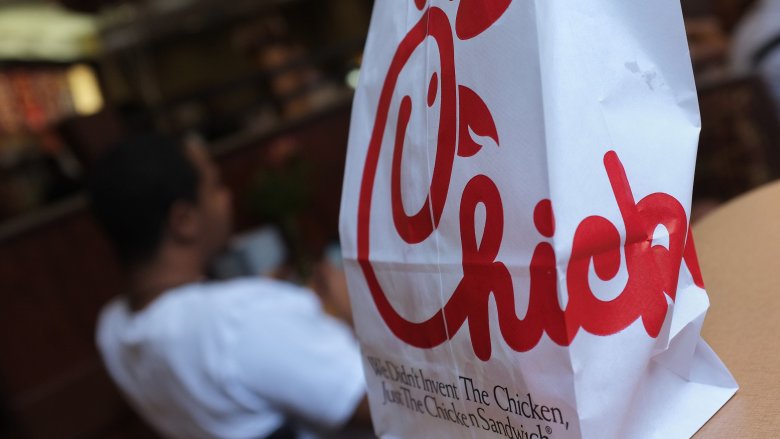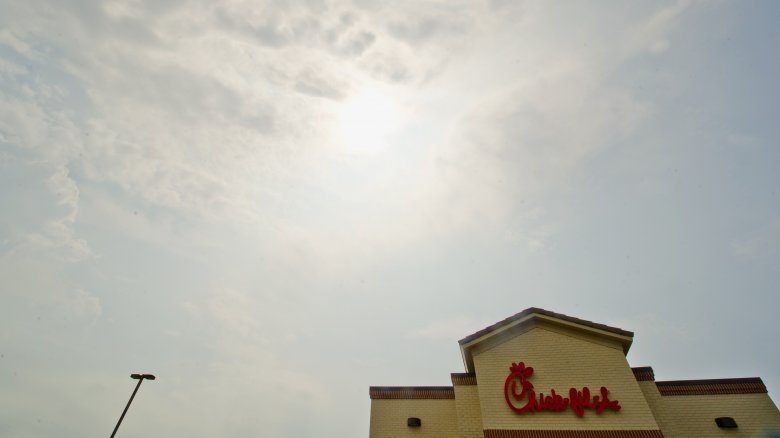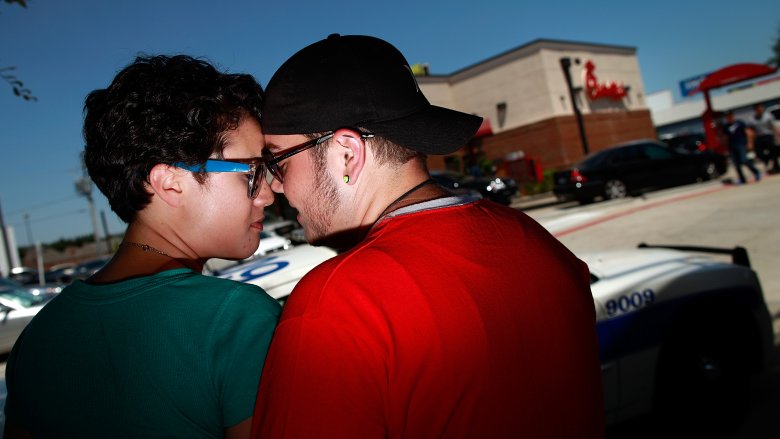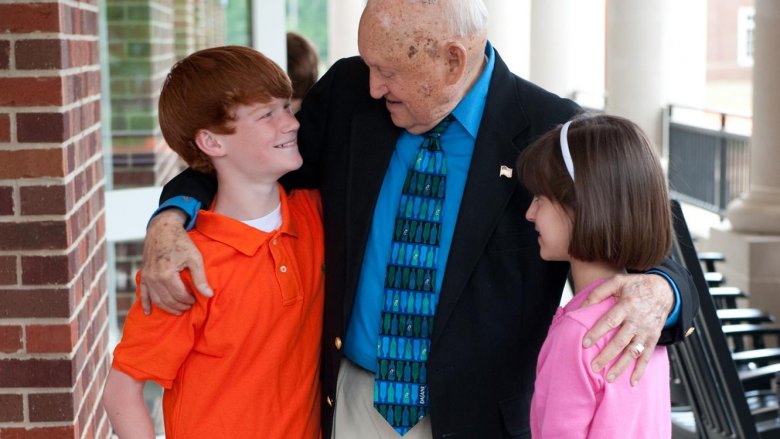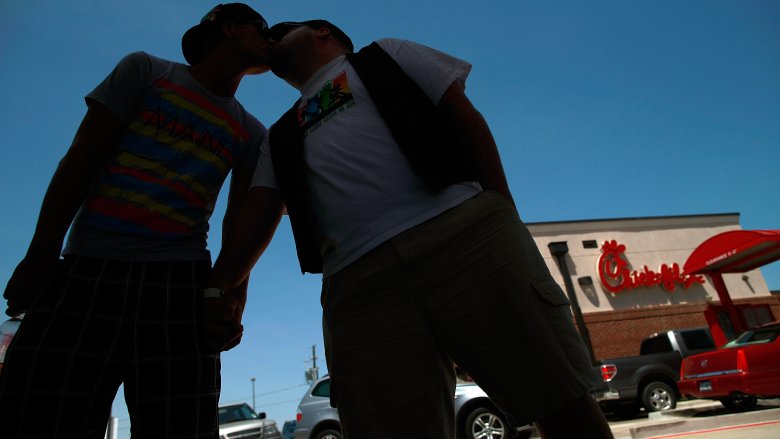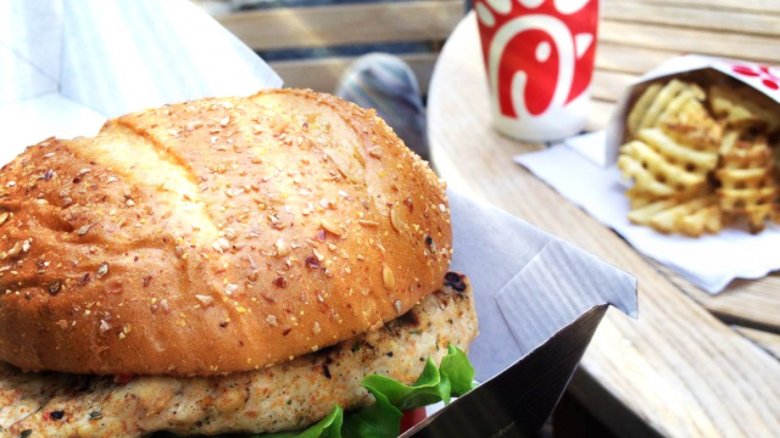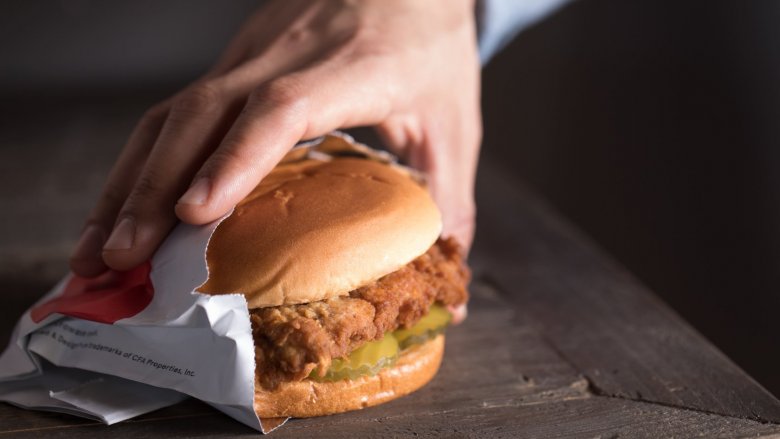Why Chick-Fil-A Really Keeps Getting Banned From Places
Chick-fil-A has a ton of fans, and those fans tend to love everything about the place. But the quick-service chicken restaurant is also hugely controversial.
The chicken chain was founded by S. Truett Cathy, and he built not on a foundation of concrete and stone, but on deeply religious beliefs. Those beliefs were so strong, says Business Insider, that they're likely one of the reasons Cathy said he never wanted the company to go public. After all, part of their missions statement says their purpose is "To glorify God by being a faithful steward of all that is entrusted to us," and that's not something that would easily stay put in a publicly-held company.
In spite of the ultra-conservative nature of the company — and because of very, very tasty chicken — MarketWatch reported that in 2018, Chick-fil-A was on the verge of becoming the third-largest fast food brand in the country. But, some have said, "Not so fast," and refused to let the chicken joint set up shop. Why? Let's take an in-depth look at just why some places just don't want Chick-fil-A on their doorstep.
Where have they been banned?
The San Antonio City Council made national headlines in March 2019 when they voted on what new restaurants would be coming to the San Antonio International Airport. NBC says that while they welcomed Boss Wood Fired Bagels and Coffee with open arms, they gave Chick-fil-A a very, very swift kick out the door.
Just two weeks later, strangely similar headlines were popping up again, as yet another city had said "No!" to a proposed Chick-fil-A. This time, it was Buffalo, New York who didn't want them opening in their Buffalo Niagara International Airport, and NBC reported that New York state lawmakers were proudly vocal about supporting the decision.
They're not the only ones taking a stand against Chick-fil-A, either. In March 2019, the dean of Rider University resigned after the college dropped Chick-fil-A from a list of potential new restaurants for the campus (via CNN).
And there are other protests and boycotts going on, too. When the Pittsburgh Marathon announced they were partnering with Chick-fil-A to sponsor the Pittsburgh Kids Marathon and the Kids of Steel program in 2016, TribLive reported the Pittsburgh Public School board voted unanimously to oppose the partnership. And also in 2016, when a high school in California considered selling Chick-fil-A as a fundraiser, it was firmly nixed by Football President Val Wyatt who said, in part (via Huffington Post): "I didn't want them on campus."
Existing locations have been protested and petitioned against
Even existing Chick-fil-A locations have felt pressure from their host cities and campuses.
In 2012, Elon University in North Carolina went to their food vendor and told them they needed to get Chick-fil-A off the campus and find another option for students, reported Huffington Post. And they weren't the first — Maryland's St. Mary's College had done the same thing the year before, and in 2016, Huffington Post reported that Georgia's Emory University first distanced themselves from the ultra-conservative beliefs of the chain, then finally removed the restaurant entirely.
Even college campuses in traditionally conservative states have seen protests and petitions to get Chick-fil-A off school grounds, says HuffPo. The Appalachian State University, the University of Southern Mississippi, the University of North Florida, and the University of South Alabama all have had student movements organized against Chick-fil-A, alongside more traditionally liberal schools like New York University.
And in other cases, some universities have removed Chick-fil-A a little more quietly. When Duke University started getting emails about the presence of the chicken chain, the associate vice president of housing appeased them by simply saying their contract was up at the end of the year anyway.
The heart of the issue
After San Antonio voted to block Chick-fil-A from opening in their airport, Councilman Roberto Trevino had this to say (via CNN): "San Antonio is a city full of compassion, and we do not have room in our public facilities for a business with a legacy of anti-LGBTQ behavior. Everyone has a place here, and everyone should feel welcome when they walk through our airport."
And that's the heart of it. Chick-fil-A responded to their decision by pointing out they already had 32 stores in San Antonio, and it was Democratic Assemblyman Sean Ryan from Buffalo that explained why there was a difference between restaurants set up on a city street, versus one built in an airport (via NBC): "The views of Chick-fil-A do not represent our state or the Western New York community, and businesses that support discrimination have no place operating in taxpayer-funded public facilities."
When Rider University blocked the chicken chain, they weren't shy about saying why they had done it, either. According to their official statement (via CNN), Chick-fil-A's "corporate values have not sufficiently progressed enough to align with those of Rider."
So, here's the thing. Everyone's heard stories about how conservative Chick-fil-A's corporate structure is, but what has the Cathy family really said?
Truett Cathy's practices
The Cathy family has done a lot of good in the world, and no one's disputing that — not even the Forbes article titled "The Cult of Chick-fil-A," which starts out by interviewing a Chick-fil-A worker who grew up in the group foster home Chick-fil-A founder S. Truett Cathy founded. But that's not what the bans are about.
The bans are about other beliefs firmly held by Cathy, an evangelical Southern Baptist, and his family. He's said he prefers to have employees who are married, because they're more productive than unmarried workers. And when it came to recruiting new franchisees, Cathy didn't just interview prospective owners, but their family and children as well. And if those interviews revealed something he didn't like? He's said he would fire an employee who "has been sinful." If that sounds like an uncomfortable amount of scrutiny put on employees' personal lives, some of them have said as much, too.
Dan Cathy's comments
In 2012, Truett Cathy's son, Dan, spoke with the Biblical Recorder — and that's what really kicked off all the fire and brimstone. After talking about how they were based on "biblical principles, asking God and pleading with God to give us wisdom on decisions we make about people and the programs and the partnerships we have," Cathy was asked about their stance on traditional marriage, and whether or not all the rumors were true. Cathy didn't deny anything. Instead, he said:
"Well, guilty as charged.... We are very much supporting of the family — the biblical definition of the family unit. We are a family-owned business, a family-led business, and we are married to our first wives. We give God thanks for that."
What, exactly, was he re-affirming? Shortly prior to that interview, Cathy had gone on a radio show and made the following comment (via The Washington Post):
"I think we're inviting God's judgment on our nation when we shake our fist at him and say [...] we know better than you as to what constitutes a marriage. And I pray God's mercy on our generation that has such a prideful, arrogant attitude to think that we would [have] the audacity to redefine what marriage is all about."
The charitable giving
Lots of companies have divisions and offshoots organized for their charitable giving. Look at Wendy's: it has the Dave Thomas Foundation for Adoption, which funds national service programs and grants to the foster care and adoption system. Chick-fil-A has the WinShape Foundation — founded by Truett Cathy.
Their mission statement says the organization "provides meaningful experiences ... that ... expose life-altering hope and truth." That's pretty vague, and in March 2019, ThinkProgress released what they found after they took a deep dive into just where Chick-fil-A's donations, most of which were funneled through WinShape, were going.
In 2017, three groups were given more than $1.8 million by Chick-fil-A and their charitable giving. The largest recipient was the Fellowship of Christian Athletes, a sports-based organization that includes this in their "Sexual Purity Statement": "The Bible is clear in teaching on sexual sin including sex outside of marriage and homosexual acts. Neither [...] constitute an alternative lifestyle acceptable to God." Other recipients included the Paul Anderson Youth Home (which teaches that same-sex marriage directly opposes the wishes of God and Jesus), and the Salvation Army, who has had their share of anti-LGBTQ doctrine.
They're not the only organizations Chick-fil-A has donated to in the past. The list Vox assembled included the Georgia Family Council, the Marriage & Family Foundation, and Exodus International. That last one? They closed their doors in 2013 after much scrutiny and decades of promoting conversion therapy to help gay people become straight (via CNN).
They've been saying they'll stop
According to Vox, Chick-fil-A promised to stop participating in the same-sex marriage debate, and some groups even said the restaurant would stop funding anti-LGBTQ groups after the fallout from Cathy's comments in 2012. But obviously, they haven't, and there's nothing that's clear-cut about Chick-fil-A's charitable giving. Organizations backed by WinShape have said (via CNN) that they're simply youth- and family-focused organizations, and there's nothing hateful about them.
But, one might ask, what about the Family Research Council? They were among the groups that regularly received donations, and they're also classified as a "Designated Hate Group" by the Southern Poverty Law Center. They're no longer getting Chick-fil-A funds, at least, as according to LGBT organization Campus Pride, Chick-fil-A had dropped "the most divisive, anti-LGBT groups" from their list on donation recipients.
Fast forward a bit, though, and Advocate was reporting that Chick-fil-A had found a bit of a loophole when it came to who gets their donations. It was Dan Cathy that was doing the donating and fundraising, not — technically — the WinShape Foundation, that time to a fundraiser for the Marriage and Family Foundation. And that organization was also founded by the Cathy family, and focused on lowering divorce rates and protecting the institute of marriage from decline.
Is it even legal to block Chick-fil-A on the basis of their beliefs?
According to Peter Kirsanow of the US Commission on Civil Rights (via Deseret News), there's a huge problem with places banning Chick-fil-A on the basis of their anti-gay marriage stance. In a letter he wrote to the Niagara Frontier Transportation Authority regarding Buffalo's decision to follow San Antonio's example, he said it was nothing short of discrimination for one big reason: he stated there was a lack of evidence that Chick-fil-A had ever actually discriminated against someone based on their sexual orientation, they just said it went against their traditional Christian beliefs. Kirsanow went on to say that the action would likely result in a lawsuit, and he's not the only one that's said so.
According to CNN, Texas's attorney general, Ken Paxton, condemned San Antonio's ban on Chick-fil-A, saying it was "discriminatory." He called for an investigation into whether or not the council's decision to prevent Chick-fil-A from opening was even legal, and he reached out to the US Department of Transportation, too. USA Today adds that other groups — like the First Liberty Institute, a religious liberty-focused law firm — were also condemning the action as religious discrimination.
Chick-fil-A's official stance
Cathy family aside, what's Chick-fil-A's official stance? After they were pushed out of consideration for Rider University, the company issued this statement to CBS News: "Chick-fil-A is a restaurant company focused on food, service, and hospitality, and our restaurants and licensed locations on college campuses welcome everyone. We have no policy of discrimination against any group, and we do not have a political or social agenda."
According to Business Insider, the chain has come a long, long way in moving past the controversy their founding family's comments have made. They've successfully opened in liberal cities like NYC, Portland, and Seattle, sales figures are on the rise, and they've done it — in part — by warning their franchisees not to talk about any beliefs about traditional marriage they might have. As a corporation, they're trying to promote a more inclusive image, even though that means still choosing very carefully when it comes to the church groups and community activism they get involved in. In all fairness, though, that's no different from what any other business does.
San Jose found another option
While San Antonio and Buffalo made it clear that Chick-fil-A wasn't going to be welcome in their airports, San Jose had a different solution.
According to The Mercury News, San Jose originally approved Chick-fil-A's presence in their airport in March 2018 — something that Councilwoman Magdalena Carrasco said "...kind of slipped under everybody's radar." By the time people started protest in the wake of the news coming out of Buffalo and San Antonio, their new Chick-fil-A was only about a month away from opening. What's a city council to do?
Former county supervisor Ken Yeager — who's currently the head of the Bay Area Municipal Elections Committee, and is the city's first openly gay elected official — said that instead of going anti-Chick-fil-A, he'd prefer to see transgender and rainbow flags posted all around it, "as a counter-signal to the discrimination supported by Chick-fil-A."
Others on the council got on board, too, endorsing their support for adding flags to the airport and declining to extend their contract from 2026 to 2028 (citing their Sunday closures as reason). But council members also made it very, very clear what they were going for, adding that they were going to promote the hiring of LGBT employees and make it the "gayest Chick-fil-A in the country."
The danger in bans
Way back in 2012, Psychology Today took a look at whether or not it's a good idea for any place or organization to outright ban Chick-fil-A on the basis of their beliefs. It's an interesting thought piece, and it's particularly relevant with the new bans put in place by entire cities and schools.
According to Marty Klein, Ph.D., even if he's uncomfortable with their politics, he's also uncomfortable with the idea that a corporation can be prevented from doing business on the basis of their beliefs about sexual orientation. He had this to say on the matter: "Excluding, ghettoizing, and damaging sexually oriented businesses is one of the last forms of discrimination in which municipalities can legally engage. It's totally unfair. So I don't want Chick-fil-A excluded by the same vigilante mentality."
So, what does Klein say should be done? Simply take your business elsewhere if you don't agree with their politics and their beliefs. Don't throw physical stones, but still, hit 'em where it hurts: their pocketbook.
It's worth noting...
It's also worth noting that when push comes to shove, some Chick-fil-A restaurants have broken corporate rules to lend a helping hand where it was needed most... even when it was the LGBTQ community that needed help.
One of the most defining traits of the company is that they have always closed on Sunday, and it's just one of those unbreakable rules. But in 2016, a Chick-fil-A in Orlando opened on a Sunday to hand out free food to first responders, blood donors, and law enforcement working at the Pulse nightclub shooting.
An official spokesperson for the company said that yes, there are occasions when they will open on Sunday to provide community aid, and even though the Huffington Post said this gesture was particularly surprising given their history of standing firmly against marriage equality, Chick-fil-A said, in part: "We do not think this requires any recognition. It is the least we can do in this community we love."
In contrast, Vox reported that when Super Bowl Sunday was kicking off in Atlanta's Mercedes-Benz Stadium in 2019, the stadium's Chick-fil-A would remain closed.
